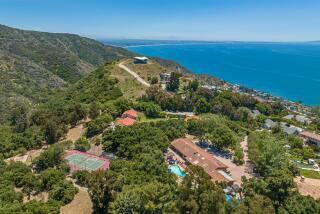Muriel Zink, 88; Author and Founder of New Directions, an Alcohol Treatment Center Tailored to the Needs of Women
Muriel Zink, a founder of New Directions for Women, one of the first alcohol treatment programs in the country designed specifically for women, has died. She was 88.
Zink, who also helped launch several recovery programs designed for both men and women, died March 24 of natural causes at Saddleback Memorial Medical Center in Laguna Hills, near her longtime home, said her husband, Russell Zink.
New Directions for Women opened in Costa Mesa in 1977 as a residential treatment program combining the essentials of Alcoholics Anonymous with physical and emotional therapies. From the beginning, counseling sessions have been tailored to women’s issues.
Alcoholism presents specific problems for women, said Dr. Joseph Pursch, a psychiatrist in the field of alcoholism and addiction who is based in Orange County. He met Zink in the early 1970s.
A woman’s alcoholism is often covered up by her husband because of the shame of it, said Pursch, who treated former First Lady Betty Ford and other prominent patients.
“When a man can no longer cover up his wife’s drinking, he walks out,” Pursch said. In many cases the court then declares the woman incompetent as a mother and takes her children away from her. “Then, she becomes a marked woman,” Pursch said.
“Women need a safer psychological area to talk about these problems,” Pursch said.
Zink often said in interviews that women with a drinking problem were called “fallen women” when she first got involved in alcoholism treatment in the late 1960s.
“Muriel started at a time when women did not go to Alcoholics Anonymous,” said Jan Christie, a former executive director of New Directions for Women and a longtime friend of Zink. There was too much shame associated with it, Christie said. “Muriel became passionate about women in recovery.”
Zink’s basic view of alcoholics was both challenging and kind. “They are not guilty for having a bona fide disease, but they are responsible for what they do about it,” she said.
Friends described Zink as diplomatic but said she could be forthright at times. “Muriel didn’t take any baloney,” said Pursch, who sometimes called on her to talk to the prominent women he treated, to help them face the facts about their addictions.
Although she was known as an advocate for women, in the mid-1970s Zink outlined a recovery program called Comprehensive Care that applied to both men and women. The program combined aspects of Alcoholics Anonymous with physical and psychological care. She helped to implement the program in several Orange County hospitals, including the South Coast Medical Center.
“Muriel gave people hope,” Claudia Black, author of several books on alcoholism and the family and a longtime friend of Zink, said in an interview with The Times this week. “She exuded a genuine acceptance, not for alcoholic behavior but for the value of the person. She gave people a sense of worthiness.”
Born Muriel Morrison in San Francisco, Zink moved to Southern California in 1946, the year she married her husband, a film actor whose professional name is Russell Conway.
In the 1950s, her social drinking became a problem. She suffered blackouts and hangovers, although she managed to keep functioning.
“My perception of an alcoholic was like the people roaming the streets with a paper bag,” Zink said in a 1997 interview.
She first recognized her condition when she took a friend to Alcoholics Anonymous meetings and stayed to keep her company. “Then one day, Muriel said, ‘My gosh, I should be going to meetings myself,’ ” her husband recalled this week.
Zink quit drinking in the late 1950s. She later entered a training program for counselors in alcoholism at UCLA. She completed it and became a certified alcoholism counselor in 1969.
Early in her career she worked in the alcohol treatment program of the Veterans Administration Hospital in West Los Angeles and later in a treatment program at College Hospital in Cerritos.
She retired in 1991. Her book, “Step by Step, Daily Meditations for Living the Twelve Steps,” was published the same year.
Along with her husband, Zink’s survivors include two children and several grandchildren and great-grandchildren.
A memorial service is planned for 2 p.m. April 15 at the Canyon Club, 20456 Laguna Canyon Road, Laguna Beach.
More to Read
Sign up for Essential California
The most important California stories and recommendations in your inbox every morning.
You may occasionally receive promotional content from the Los Angeles Times.










